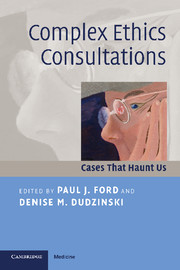Book contents
- Frontmatter
- Contents
- List of contributors
- Foreword
- Acknowledgments
- Introduction: Live and learn: courage, honesty, and vulnerability
- Part I Starting at the beginning: prenatal and neonatal issues
- 1 Quality of life – and of ethics consultation – in the NICU
- 2 When a baby dies in pain
- 3 But how can we choose?
- 4 Maternal–fetal surgery and the “profoundest question in ethics”
- Part II The most vulnerable of us: pediatrics
- Part III Diversity of desires and limits of liberty: psychiatric and psychological issues
- Part IV Withholding therapy with a twist
- Part V The unspeakable/unassailable: religious and cultural beliefs
- Part VI Human guinea pigs and miracles: clinical innovations and unorthodox treatment
- Part VII The big picture: organizational issues
- Conclusions, educational activities, and references
- Index
2 - When a baby dies in pain
Published online by Cambridge University Press: 03 May 2010
- Frontmatter
- Contents
- List of contributors
- Foreword
- Acknowledgments
- Introduction: Live and learn: courage, honesty, and vulnerability
- Part I Starting at the beginning: prenatal and neonatal issues
- 1 Quality of life – and of ethics consultation – in the NICU
- 2 When a baby dies in pain
- 3 But how can we choose?
- 4 Maternal–fetal surgery and the “profoundest question in ethics”
- Part II The most vulnerable of us: pediatrics
- Part III Diversity of desires and limits of liberty: psychiatric and psychological issues
- Part IV Withholding therapy with a twist
- Part V The unspeakable/unassailable: religious and cultural beliefs
- Part VI Human guinea pigs and miracles: clinical innovations and unorthodox treatment
- Part VII The big picture: organizational issues
- Conclusions, educational activities, and references
- Index
Summary
Case narrative
Baby Zelda was delivered by C-section at 25 weeks of gestation to an 18-yearold first-time mother. The pregnancy was complicated by a maternal urinary tract infection, prolonged ruptured amniotic membranes, amnionitis, and fetal distress. The infant required aggressive resuscitation that included oxygen, tracheal intubation, and assisted ventilation. Following successful resuscitation and stabilization, the infant was admitted to the neonatal intensive care unit (NICU). Support measures included oxygen, assisted ventilation, parenteral maintenance of fluids and nutrition, antibiotics, red blood cell transfusions, and analgesia. Unfortunately, Baby Zelda's respiratory status deteriorated, requiring increased oxygen and ventilator support. She was also hypotensive, so pressors were added. Toward the end of the first week of life, she developed signs of necrotizing entercolitis (NEC), a potentially serious complication of prematurity involving the immature gastrointestinal tract. Zelda's necrotizing entercolitis progressed and her condition reached the point that surgical intervention, with a view toward resection of the damaged bowel, was necessary. However, at surgery the extent of bowel involvement appeared to be too great to permit definitive resection. Accordingly, as is the standard of care in such cases, the abdomen was closed. Aggressive medical care was continued and a “second look” was planned in several days. The second look showed that most of the patient's bowel was irreversibly damaged. Any attempt to remove the involved area would leave Zelda with a much shortened, nonfunctional bowel – incompatible with long-term survival.
In a postsurgery conference, the surgeons and NICU team counseled the family, relaying that there was no definitive treatment for the baby's condition, no chance for survival, and a100%risk of suffering.
- Type
- Chapter
- Information
- Complex Ethics ConsultationsCases that Haunt Us, pp. 22 - 28Publisher: Cambridge University PressPrint publication year: 2008



